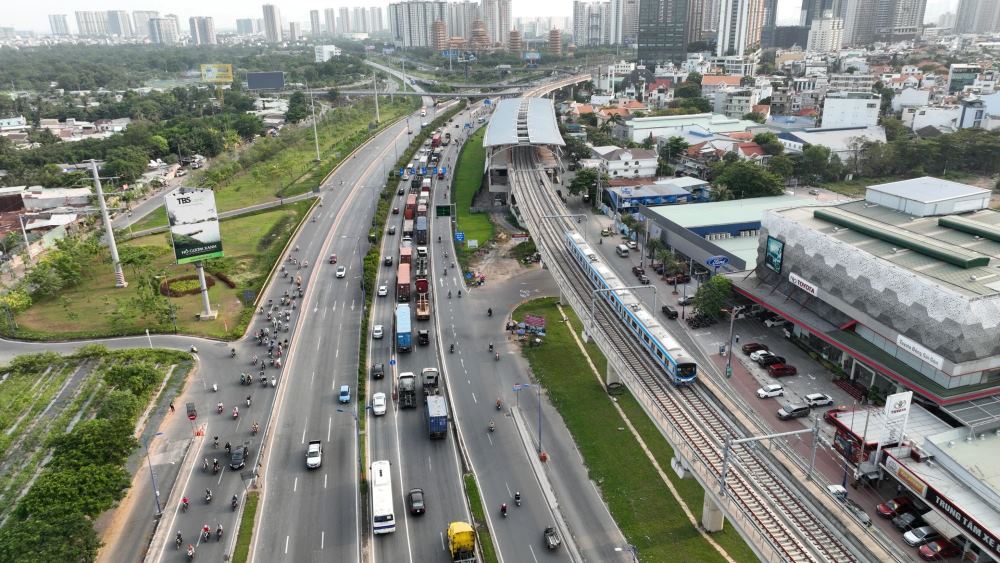Influences of ESG standards on the trend of green office building

How are ESG standards influencing the development trend of green office projects like OneHub Saigon, and what positive transformation is occurring in the real estate sector? How will the vision and orientation of businesses and investors change? In this article, let’s explore how developers and businesses leverage ESG to develop green office building projects, thereby creating a healthy and sustainable working environment.
What is the ESG standard?
ESG (stands for Environmental, Social, and Governance) is a widely adopted standard for businesses aiming to develop in a sustainable and long-lasting direction. This criteria is used to assess, manage, and measure the social and environmental impacts of a business’ operations. Simultaneously, it is also regarded as a framework to support financial management based on transparency and adherence to legal regulations. Within this framework, the key elements of ESG standards encompass environment, social, and governance.
- Environmental (E): Measures the business’s impact on the environment, including reducing emissions, using renewable energy, managing waste and resources, preserving biodiversity, and reducing environmental pollution.
- Social (S): Measures the positive influence of a business on the community and society, encompassing considerations for labor rights, worker safety and health, diversity and equity, community development, and providing favorable living conditions for employees.
- Governance (G): Measures the quality of a business’s management and operations, including the application of ethical and transparent standards in business decisions, risk management, respecting shareholder rights, and ensuring legal compliance.

The ESG standard comprises three key elements: Environment, Social, and Governance
By focusing on ESG standards, businesses try to promote sustainable growth and create long-term value for all stakeholders, including shareholders, employees, customers, and the social community.
Businesses and the ESG vision
ESG standards not only assess a business’ CSR but also serve as a factor for talent recruitment, customer attraction, and sustainable development. Ensuring a conducive working environment, committing to positive contributions to society, and practicing effective governance will bring substantial benefits to the business.
Businesses implementing ESG standards effectively can be seen as a commitment to both the environment and society. This fosters a positive and trustworthy image in the eyes of the public and employees. Following ESG standards well is considered as a favorable signal for partners and customers, instilling trust and willingness to invest in the projects the business is developing.
Moreover, not only does it attract partners, but the ESG vision itself is also a significant factor that helps businesses attract a multitude of talents. In reality, candidates often opt to work for companies demonstrating its CSR and making positive contributions to the community. To them, enterprises proactively adhering to ESG standards tend to offer enhanced personal and professional development opportunities based on the core values of Environment – Social – Governance. As a result, these businesses effortlessly draw in talents from diverse fields.

ESG is a factor for attracting talents
Additionally, ESG criteria also contribute to cost savings, risk management, and ensuring transparency in business operations. These are the top three crucial issues that businesses need to pay attention to in order to ensure their long-term sustainability:
- Enforcing ESG standards encourages businesses to optimize resource usage, reduce waste, and save energy. By employing resource-efficient technologies and transitioning to renewable energy sources, companies can trim operational costs and energy consumption, therefore enhancing overall business efficiency.
- ESG standards also drive businesses to conduct risk analysis and identify opportunities related to the market, environment, and society. This helps businesses anticipate and respond to potential risks, ensuring sustainability in their operations and boost financial capacity.
- ESG standards require businesses to provide transparent information about their environmental, social, and governance activities. This contributes to strengthening trust with customers and investors, enhancing long-term relationships, building credibility, and attracting sustainable investments.
A specific example of applying ESG standards in businesses is the utilization of green offices. A prominent green office building project can be highlighted – the Integrated Business Park OneHub Saigon in Saigon Hi-Tech Park. The green office buildings within this project have achieved LEED certification, ensuring environmental friendliness. Notably, Tower 1, certified with LEED Silver, has become operational and attracted numerous tenants.
LEED certification is awarded to green office buildings based on various factors such as: Indoor environmental quality, Optimized energy usage, Lush greenery surrounding the office… and Location of the green construction. It is not just a certification following the “green trend,” but LEED also helps businesses effectively meet the stringent requirements of ESG standards.

Some factors to evaluate the green office of LEED certification
Following the ESG standards and the core criteria of a typical “green office building,” OneHub Saigon creates a healthy working environment, efficiently minimizing potential impacts on the quality of work. Additionally, the project pays attention to the mental well-being of employees working here by incorporating abundant lush greenery around the office, ensuring optimal operational conditions for the overall development of the community.
It is evident that improving the working environment by choosing a green office building like OneHub Saigon helps enhance the health of employees and creates favorable conditions for their development and contribution in work.

Tower 1 – The green office building at OneHub Saigon
Not only OneHub Saigon Tower 1 but also many green office building projects have emerged in rapidly developing areas in Vietnam such as Hanoi and Ho Chi Minh City. Besides the purpose of meeting ESG standards, these projects also aim to attract businesses that aspire to sustainable development.
According to experts in the field of green construction, businesses currently are increasingly inclined to rent green office buildings to optimize operational costs. By renting this kind of office, companies can save up to 20% on monthly energy expenses. This energy-saving aspect particularly contributes to the Environmental and Social factors of the ESG standards. It can be observed that ESG has played a role in creating the trend of constructing green offices to meet businesses’ needs for an ideal working environment.
In summary, the ESG standards not only bring benefits to society and the environment but also serve as a golden opportunity for businesses to thrive and achieve sustainable development in the current challenging and competitive era.
Investor’s direction and development
In recent times, the assessment and management of ESG factors have become an important trend in the real estate investment sector. Investors and businesses alike recognize the significance of ESG standards. Based on these criteria, businesses can proactively implement policies to ensure sustainable development and create shared benefits for the community in the future.
Aligned with this trend, Gaw NP Capital – a leading real estate investment fund in Asia and the developer of OneHub Saigon along with many other valuable real estate projects nationwide, has been focusing particularly on developing projects based on the principles of ESG. Gaw NP Capital carefully considers and evaluates social and environmental factors when selecting as well as implementing projects, ranging from the use of sustainable technology and energy sources to the ability to provide living conditions and employment opportunities for the surrounding community. This demonstrates Gaw NP Capital’s commitment to ensuring a balance between economic and social benefits, thereby promoting sustainable development and creating long-term value for the Vietnamese economy.

Investors are placing greater emphasis on constructing green office buildings that effectively meet ESG standards for businesses
In reality, the real estate market has also witnessed an increase in the number of buildings certified for green offices. Key cities such as Ho Chi Minh City and Hanoi are recording a growing presence of buildings with green office certifications. Some notable green projects currently include Phu My Hung Tower, Deutsches Haus, OneHub Saigon in Ho Chi Minh City, and the Capital Place project in Hanoi. This increase reflects a positive shift within the real estate industry towards raising awareness among the business community and investors based on the core values of ESG standards.
In general, emphasizing ESG has become an important direction in the investment and real estate development sector. These efforts of businesses and investors will contribute to building a sustainable future, creating value not only for themselves but also for the community and the surrounding environment.
Conlusion
The trend of constructing green office buildings has become more popular, mainly due to various factors, including the main emphasis on ESG standards for businesses. High-quality Grade A green office buildings like OneHub Saigon, developed by GawNP Capital, are being increasingly implemented. These projects will create favorable conditions for businesses to implement ESG standards more easily, thereby generating significant value not only for the businesses, their workforce but also for the entire society.
Find out: $70 million data center 1Hub Data Center



